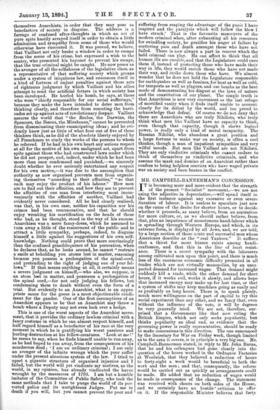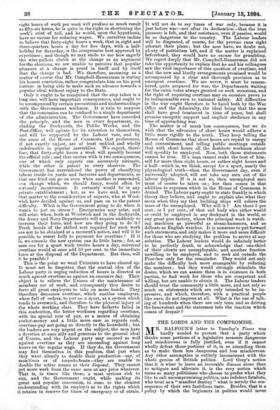MR. CAMPBELL-BANNERMAN'S CONCESSION.
IT is becoming more and more evident that the strength of the present " Socialist " movement,—we are not using the adjective in depreciation,—will spend itself in the first instance against any excessive or even severe duration of labour. It is useless to speculate just now on the cause of the desire for shorter hours, or to decide whether it proceeds, as many believe, from an aspiration for more culture, or, as we should rather believe, from that, plus an impatience of monotonous hand-labour which is spreading through Western Europe, and which, in its extreme form, is displayed by all Jews, and, we are told, by a large section of those acute and successful men whom Americans describe as the "real Yankees." It suffices, that a thirst for more leisure exists among handi- craftsmen, and that this is the line of least resist- ance. There is a secret sympathy with the labourers among cultivated men upon this point, and there is much less of the enormous economic difficulty presented in all trades which are not virtually monopolies, by an unex- pected demand for increased wages. That demand might suddenly kill a trade, while the other demand for short hours, if it works evil, works it slowly, and allows hope that increased energy may make up for lost time, or that a system of shifts may keep machines going as easily and as profitably as long hours. There is, to speak plainly, much more willingness on the part of capital to try this social experiment than any other, and we fancy that, even without the influence of the vote, it will by degrees be very generally tried. We are not, therefore, sur- prised that a Government like that now ruling the British Empire, which not only seeks popularity, but thinks popularity an ideal end, as evidence that the governing power is really representative, should be ready to make concessions in this direction. The one announced by the Secretary for War on Friday week, though limited as to the area it covers, is in principle a very big one. Mr. Campbell-Bannerman stated, in reply to Mr. John Burns, that he and his colleagues had gone closely into the question of the hours worked in the Ordnance Factories at Woolwich, that they believed a reduction of hours to forty-eight a week would be beneficial to both the work and the men ; and that, consequently, the reform would be carried out as quickly as arrangements coati be made. He added that no reduction of wages would be made in consequence of the change. The statement was received with cheers on both sides of the House, and we certainly have no hostile' criticism to offer on it. If the responsible Minister believes that forty eight hours of work per week will produce as much result as fifty-six hours, he is quite in the right in shortening the week's stint of toil, and he would, upon the hypothesis, have no excuse for reducing wages. We ourselves incline to believe that forty-eight hours a week, that is, eight and three-quarters hours a day for five days, with a half- holiday for Saturday, is the compromise best approved by experience ; and though we may smile to see how eagerly the wire-pullers clutch at the change as an argument for the elections, we are unable to perceive that popular pleasure at a change is proof in itself and by itself that the change is bad. We therefore, assuming as a matter of course that Mr. Campbell-Bannerman is stating his honest conviction, rather congratulate him on his good fortune in being able to make such an advance towards a popular ideal without injury to the State. Only it ought to be recognised that the step taken is a long one, will have important consequences, and ought to be accompanied by certain precautions and understandings with the Government workmen. It is vain to suppose that the concession can be confined to a single department of the administration. The Government have conceded the principle, and the men in every department, in- cluding the Dockyards, the Public Works, and the Post-Office, will agitate for its extension to themselves, and will be supported by the Labour vote, and by the sense of the House of Commons, that preferences, if not exactly unjust, are at least unkind and wholly indefensible in popular assemblies. We expect, there- fore, that forty-eight hours a week will speedily become the official rule ; and. that carries with it two consequences, one of which only experts can accurately estimate, while the other is patent to every observer. The Government has surrendered the power of classifying labour inside its yards and factories and departments, so that one kind can go on even when another is suspended, —a change which, we should fancy, would often be seriously inconvenient. It certainly would be in any private establishment ; but, as we have said, we leave that matter to the consideration of experts, who at Wool- wich have decided against us, and pass on to the patent difficulty. What is the Government going to do when it wants to put on steam ? Emergencies may arise, and will arise, when, both at Woolwich and in the dockyards, the Army and Navy Departments will require suddenly to increase their force, and how are they going to do it ? Fresh hands of the skilled sort required for such work are not to be obtained at a moment's notice, and will it be possible to resort fully to payment for overtime ? If it is, we concede the new system can do little harm ; for, as men can for a spurt work twelve hours a day, universal overtime would at once add 50 per cent. to the immediate force at the disposal of the Department. But then, will it be possible ? This is the point we want Unionists to have cleared up. It must not be forgotten that the central idea of the Labour party in urging reduction of hours is directed as much against overtime as against an excessive day. Their object is to relieve the Unions of the maintenance of members out of work, and consequently they desire to force all great employers to take on more hands. They therefore- denounce overtime, which enables employers, when full of orders, to put on a spurt, as a system which tends to overwork, and therefore to the physical injury of the whole working class. They have hitherto failed in this contention, the better workmen regarding overtime, with its special rate of pay, as a means of obtaining pocket-money and a little more ease as regards cash, overtime-pay not going so directly to the household ; but the leaders are very urgent on the subject, the men have a devotion at once silly and generous to the general ideal of Unions, and the Labour party may succeed as well against overtime as they are succeeding against long hours on the regular wage. If they do, the Government may find themselves in this position, that just when they want silently to double their production—say, of munitions or of torpedo-boats—they are unable to deuble the active means at their disposal. They cannot get more work from the same men at any price whatever. That is, in times like these, a most serious risk to run, and the Government ought, while making its (meat and popular. concession, to come to the clearest understanding with its employs as to the rights which it retains in reserve for times of emergency or of strain. It will not do to say times of war only, because it is just before war—not after its declaration—that the true pressure is felt, and that resistance, even if passive, would be so dangerous to the country. The Labour leaders will be disgusted, of course, for the proviso runs right athwart their plans ; but the men have, we doubt not, plenty of patriotism left, and if the matter is explained beforehand, they would have no excuse for grumbling. We regret deeply that Mr. Campbell-Bannerman did not take the opportunity to explain that he and his colleagues saw the vital importance of this question of overtime and that the new and kindly arrangements promised would be accompanied by a clear and thorough provision as to emergent overtime. We are never, it must be remem- bered, quite prepared for war, the Departments waiting for the extra votes always granted on such occasions, a,nd the right of requiring overtime may on occasion prove to be indispensable even to national safety. All difficulties in the way ought therefore to be faced both by the War Office and the Admiralty, the ideal being that the men shall have good treatment in time of peace, but shall promise energetic support and implicit obedience in any time of approaching war. The matter is of much less consequence, but we do wish that the advocates of short hours would adhere a little more rigidly to the truth. They keep telling the House of Commons that short hours are repaid in energy and contentment, and telling public meetings outside that with short hours all the destitute workmen about will speedily be employed. Now, both those statements cannot be true. If a man cannot make the best of him- self for more than eight hours, or rather eight hours and a half—which is, we think, except for a spurt, nearly the physiological truth—then the Government day, even if universally adopted, will not take any men out of the labour deptits. If it is not so, then unemployed men must of course be taken on ; but then conies in that addition to expenses which in the House of Commons is denied. The Labour party ought to state frankly in which theory they believe, and ought to explain also what they mean when they say that building ships will relieve the mass of the unemployed. Why will it ? Are there 5 per cent., or 1 per cent., of that sad body who either would or could be employed in any dockyard in the world, or any great gun factory, where the principal work is watch- ing machines as powerful as steam-hammers, and as delicate as English watches. It is nonsense to put forward such statements, and only makes it more and more difficult for those who are studying the problem to arrive at any solution. The Labour leaders would do infinitely better to be perfectly frank, to acknowledge that one-third of their clients are unemployable, and another fraction unwilling to be employed, and to seek aid outside the Poor-law only for the remainder. They would not only make the difficulty look more manageable by reducing the numbers ; but they would strongly stimulate the desire, which we can assure them is in existence in both parties, to find work for those who are competent and willing, but are unable to obtain it. The Labour leaders should trust the community a little more, and not rely so much on statements which are only intended to be im- pressive, and which, therefore, with a practical people like ours, do not impress at all. What is the use of talk- ing of hundreds when there are only tens, and so driving the benevolent and the statesmen into the inaction which comes of despair ?







































 Previous page
Previous page